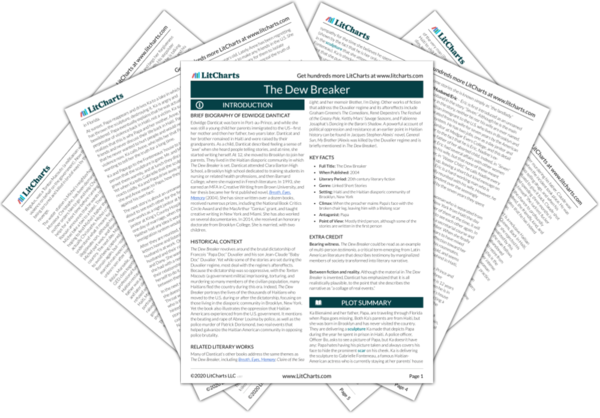One of the very first things readers learn about Papa is that he has a scar across his face, which Ka says is from the year he spent in prison in Haiti. By the end of the book, it is revealed that the scar was actually caused by the preacher slashing Papa’s face with a broken chair leg after Papa arrested him and brought him to prison. So while the story Papa tells Ka about getting the scar in prison is technically true, it is misleading. It implies that Papa was the victim of persecution when in fact, he was the perpetrator. In this sense, the scar symbolizes how violence cannot be easily understood outside of the context in which it occurs. While the scar makes Papa look like a victim—and while it is technically true that in the moment of being struck with chair leg, he was a victim of violence—the overall context of the preacher’s arrest shows that Papa was the perpetrator.
The scar also highlights important points about the themes of memory, erasure, and haunting. When Papa kills the preacher, the preacher feels vindicated by the fact that he managed to scar Papa’s face. He knows that this means that for the rest of Papa’s life, Papa will be unable to avoid the memory of the brutality he inflicted on others. Ka’s descriptions of how her father hates having pictures taken of himself and always hides his scar proves this to be right. Although Papa lies about the scar’s origin, he cannot escape the its power as a reminder of the past. Indeed, just as the preacher predicted, the fact that Papa has to lie about the scar makes him even more inescapably aware of the truth. By inflicting the scar on Papa’s face (rather than another part of his body), the preacher ensures that Papa cannot cover it up. The scar becomes part of who Papa is—a core element of his identity. In a sense, this is the opposite of the “face scalping” practiced by Emmanuel Constant’s militia. While face scalping involved removing the skin from the face of a corpse in order to make it unidentifiable, the scar makes visible the reality of who Papa is—a dew breaker, someone who tortured and killed people for a living.
Papa’s Scar Quotes in The Dew Breaker
My father has never liked having his picture taken. We have only a few of him at home, some awkward shots at my different school graduations, with him standing between my mother and me, his hand covering his scar. I had hoped to take some pictures of him on this trip, but he hadn't let me. At one of the rest stops I bought a disposable camera and pointed it at him anyway. As usual, he protested, covering his face with both hands like a little boy protecting his cheeks from a slap. He didn't want any more pictures taken of him for the rest of his life, he said, he was feeling too ugly.
I’d used a piece of mahogany that was naturally flawed, with a few superficial cracks along what was now the back. I’d thought these cracks beautiful and had made no effort to sand or polish them away, as they seemed like the wood's own scars, like the one my father had on his face. But I was also a little worried about the cracks. Would they seem amateurish and unintentional, like a mistake? Could the wood come apart with simple movements or with age? Would the client be satisfied?
And yet he had not been completely defeated. The wound on the fat man’s face wasn’t what he had hoped, he hadn’t blinded him or removed some of his teeth, but at least he’d left a mark on him, a brand that he would carry the rest of his life. Every time he looked in the mirror, he would have to confront this mark and remember him. Whenever people asked what happened to his face, he would have to tell a lie, a lie that would further remind him of the truth.












